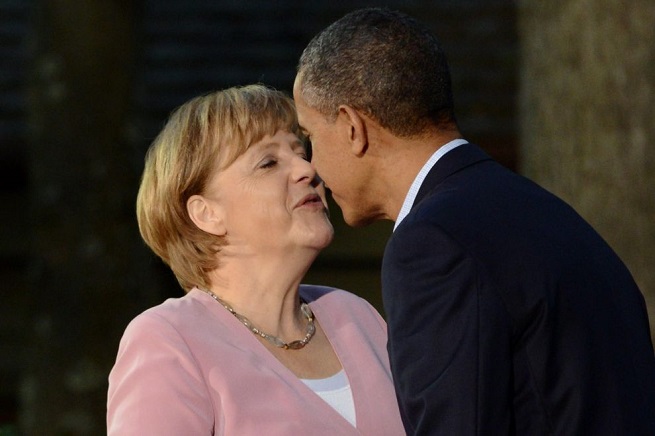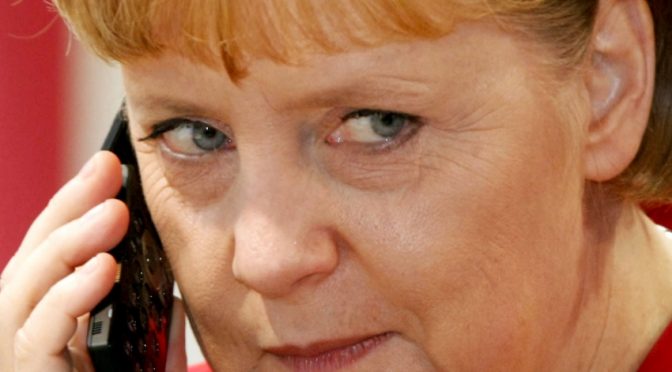Due to this lady’s mixed signal transmissions, even the Germans are now asking if she’s serving a foreign power, most specifically, the Central Intelligence Agency.
The Agency is, of course, just a branch of the Vatican-Nazi Intelligence Network and should not come as a surprise if the above question is confirmed.
https://www.youtube.com/watch?v=Ez6l2Gxa544
Behind the limelight, intellectuals between Russia and Germany expressed their collective desires to pursue constructive engagement between the two countries and in a broader sense, to navigate along the BRICS Alliance led initiatives as a better way of moving the whole planet forward.
Is Merkel a CIA Asset?

The claims that Merkel’s government knew about German state intelligence spying on behalf of the Americans against the country’s own industrial interests raise disturbing questions about the integrity of German government leaders.
Finian Cunningham, 17:54 30.04.2015(updated 18:22 30.04.2015)
The apparent betrayal of German national interests by Chancellor Angela Merkel is not only evident over the recent industrial spying scandal on behalf of America. The slavish pursuit by Merkel of Washington’s anti-Russian policy over Ukraine — in contradistinction to her country’s national interests — also cogently suggests that the chancellor is serving a foreign master.
Recent reports that German state intelligence was spying on behalf of the Americans against the country’s own industrial interests are bad enough. But then added to that are claims that the government of Chancellor Angela Merkel knew about the espionage — and turned a blind eye.
This raises disturbing questions about the integrity of German government leaders, and primarily Angela Merkel. Is Merkel an asset for American intelligence, serving the geopolitical interests of Washington rather than the good of her own nation, or the wider good of Europe?
The news story in question refers to reports in the German media last week of how Germany’s Federal Intelligence (BND) collaborated with the US National Security Agency (NSA) in spying on multinational European defence companies, including EADS and Eurocopter. The specific eavesdropping on these firms — in which Germany has major national economic interests — reportedly dates back to 2008. It is inconceivable that the highest levels of German government, including Chancellor Merkel — did not know about the industrial espionage. Yet Merkel appears to have countenanced the illegal activity, even though such activity would have vitiated German national interests, affording advantage to American competitors.
First of all, the idea that German state intelligence is thoroughly penetrated by American secret agencies is not an outlandish theory.
Far from it. The functioning of the BND as part of the American intelligence apparatus has been going on for decades, since the US oversaw the postwar rehabilitation of defeated Nazi Germany. The Americans and the British wove German intelligence — much of it inherited from the Nazi war machine — into their European-wide operations. German historian Josef Foschepoth and expert on postwar allied intelligence operations says that the West German government signed a secret pact with Washington and London, in 1968, known as the NATO Status of Forces Agreement. That pact mandates “intensive collaboration” and continues to this day — more than two decades since the reunification of Germany.
In essence, the American secret services like the NSA and Central Intelligence Agency (CIA), have a free hand to carry out massive surveillance in Germany against whomever they want, whether private citizens or industrial companies. And all with the help of German state intelligence and the federal government.
The tip of this iceberg in espionage and snooping was further revealed with the disclosures in 2013 by former American NSA operative Edward Snowden. Among the trove of revelations made by Snowden was the finding that American intelligence had been tapping the personal communications of German Chancellor Angela Merkel. The eavesdropping dated back to 2002 — three years before the leader of the Christian Democrat Union first became chancellor.
The telling thing is how puny and pusillanimous was the reaction from the German authorities to this disclosure of illicit spying by Washington. Apart from an initial bout of handwringing by Merkel and other Berlin figures, the whole scandal was quickly swept under the carpet as if it never happened. That suggests that the German government was already well aware of its compromised, subservient relation to Washington, as manifested by intrusive access to communications at the highest level.
As noted above such a master-servant relationship between the US and Germany was a fundamental tenet of the postwar American reconstitution of that country, and the predominant role devolved to NATO by Washington over European security affairs. The German government was apprised of, indeed was a willing party to, its subservient role to American intelligence and the free hand given to the latter. So, when the rest of the world learnt of American government spying on Merkel back in 2013 from the Edward Snowden’s leaks, perhaps the least surprised person would have been Merkel and her administration. Hence the meek response from Berlin towards Washington and, to any objective observer, its shockingly invasive conduct against German “allies”.
Further explosive testimony on the systematic penetration of American intelligence of German institutions came in recent months from former senior newspaper editor, Udo Ulfkotte. In several media interviews and in a best-selling book, Ulfkotte tells how German journalists and politicians are routinely recruited as CIA assets to spin stories or promulgate policies that are aimed at serving the geopolitical interests of Washington, not the interests of the German people. The former editor of Frankfurter Allgemeine Zeitung — one of Germany’s best-known newspapers — confessed that he was one of the CIA’s assets for many years, publishing stories that he knew to be false and which were damaging to international relations, and in particular antagonistic towards Russia.
In an interview with RT last year, Ulfkotte said: “It is not right what I have done in the past, to manipulate people, to make propaganda against Russia, and it is not right what my colleagues do, and have done in the past, because they are bribed to betray the people not only in Germany, all over Europe… I am very fearful of a new war in Europe, and I don’t like to have this situation again, because war is never coming from itself, there is always people who push for war, and this is not only politicians, it is journalists too.”
There is no reason to believe that the same domineering relation does not hold between US secret government and other European counterparts.
But given Germany’s central importance to the economy and policies of the European Union and its historical growing ties with Russia since the Second World War, Berlin would be a prime target for the Americans to exert leverage for their geopolitical advantage.
When we look at German policy towards Russia over the Ukraine conflict it seems absurd on the face of it. German small businesses, major export companies and farmers are losing heavily from the Western sanctions imposed on Russia and from Moscow’s counter-sanctions. Polls also indicate German public opinion is not supportive of the hostile policies, policies that have emanated from Washington and which the European allies have adopted, largely at the behest of Berlin.
This week Chancellor Merkel warned that EU sanctions against Russia may be extended if Russia does not “fulfil the Minsk ceasefire accords”.
Merkel’s logic is risible. There is no evidence that Russia has subverted Ukraine or has a military presence there. It was Russian President Vladimir Putin who helped broker the Minsk ceasefire. All the evidence, including reports by the Organisation for Security and Cooperation in Europe, points to the truce being breached by the Western-backed Kiev regime. It is the Kiev regime that is not fulfilling its commitments under the Minsk accords, yet Merkel chooses, illogically, to castigate Russia.
Moreover, it is Washington that has sent hundreds of its troops into Ukraine in the past week to carry out military exercises with the armed forces of non-NATO member Ukraine. Why is Merkel so silent when it comes to censuring Washington and its puppet-regime in Kiev over what are egregious threats to peace? Her silence is incriminating.
Merkel’s take on Ukraine and Russia is so completely at odds with reality and against the national interests of her own people, the question of just who is she serving comes to the fore. The recent industrial spying scandal on German companies carried out by the US — with German federal collusion — and the long-time surveillance of the chancellor’s personal life points to Merkel being a compromised leader. Or, in a word: bought.
The views expressed in this article are solely those of the author and do not necessarily reflect the official position of Sputnik.
German-Russian Dialogue in Baden-Baden Hears Zepp-LaRouche

April 28, 2015 (EIRNS)—During her speech at Germany’s prestigious Fourth Cultural and Business Forum “East-West Dialogue,” April 24-25, in the southwestern spa city of Baden-Baden, Schiller Institute founder and chairwoman Helga Zepp-LaRouche addressed the danger of the breakdown crisis of the Western financial system and the current confrontationist policies leading to world war. The alternative is the BRICS perspective, she said in her prominent intervention during the first day of the conference before leading Russian and German personalities. Europeans should seize upon this opportunity of a newly emerging world, to find a constructive way out of the crisis. She stressed, that this view is also held by many Americans, who oppose the destructive geopolitics of the Obama Administration.
Russian Foreign Minister Sergei Lavrov sent a greeting to the conference, as did other German and Russian officials. It was read at the evening concert by a high-level official of the Russian Foreign Ministry.
Zepp-LaRouche’s warnings of a new fascism and war were referenced several times by other speakers afterwards. Alla G. Grasnova, the president of the Russian government’s Financial University, who chaired the organizing committee of the forum, made a very passionate appeal in her closing remarks that day to the participants, to stop this new drive into catastrophe, 70 years after the end of World War II, thanking Mrs. Zepp-LaRouche for her clear stand as a German personality against these dangers and for her overall optimistic approach.
The Culture and Business Forum this year was expanded to the broader notion of “East-West Dialogue,” taking into account the new BRICS perspective, instead of just Russian-German relations, as in the past. As a featured speaker, Prof. Shi Ze of the China Institute of International Studies in Beijing, who had adressed last year’s International Schiller Institute conference in Frankfurt, spoke on the New Silk Road policy and China’s inclusive “win-win policy.” In another speech, he elaborated on matters of energy collobration between Russia and China. His contributions, which he gave in Russian, were very well received.
The Baden-Baden event was addressed by, among other personalities from Russia, senior officials of the Russian Foreign and Finance Ministries and Duma representatives, as well as by leading figures of German-Russian economic relations. One very important aspect of the event and other related conference-events was that it also gave German participants a much clearer idea of the acute danger of the situation in and around Ukraine, which will hopefully lead to effective action to prevent catastrophe.
From the German side, Klaus Mangold, the Russian honorary consul in Stuttgart and former chairman of the Ost-Ausschuss der Deutschen Wirtschaft (Committee on Eastern European Economic Relations) of German industry, in his speech, denounced the sanctions and the cutoff of official dialogue channels between Europe and Russia. He also urged both Europeans and Russians to realize how urgent it is to engage in official dialogue between the EU and the Eurasian Economic Union. That despite the opposition of certain EU governments, in particular the Baltic states and Poland. The catastrophic situation for German industry through the EU/NATO sanctions was highlighted by Mangold and Russian representatives, who reported that during the first two months of 2015, German exports to Russia decreased by 35%.
Russian speakers at the event expressed hope that the BRICS process will lead to new kinds of financial institutions that are focussed on the development of infrastructure and high-tech small and medium enterprises (SMEs) in Russia, modelled on the German Mittelstand. While there is the absolute wish to secure and expand relations with Germany and other European countries, it was also made clear by several speakers, that Russia has no choice other than to turn to the Eurasian perspective, in any case.
After two full days of panels, discussions, an evening concert with first-class Russian artists and children’s choruses, and other opportunities to exchange ideas, the conference concluded with a panel on “investments into the future” in culture, medicine and education. There, Zepp-LaRouche gave an inspiring, forward-looking speech on the future of mankind and the new paradigm. Picking up on fears by some in Russia, that China might become too influential in the current turn of events, due to its breathtaking economic development, she highlighted the Russian contribution for the Eurasian Land-Bridge, with a selection of slides of the many seminars to which the Helga and Lyndon LaRouche were invited by leading Russian intellectuals during the last decades, shaping the Eurasian Land-Bridge conception, including the Bering Straits initiative. Quoting from Deputy Prime Minister Dmitry Rogozin’s statement that all the BRICS countries are cosmic nations, she said that this is the path for all mankind, and is the only way to solve problems such as today’s droughts in California and other huge challenges. She encouraged everybody to focus on the development of human creativity as the sole source to transform the universe to a higher level, which is mankind’s destiny.
EIR

One of the significant sources of funds for the Khazarian Mafia is the healthcare industry which registered a whopping $3.09 trillion in 2014, and is projected to soar to $3.57 trillion in 2017, in the US alone. We believe that this is just a conservative figure.
We can avoid using drugs, defeat any viral attack and scaremongering easily by knowing how to build our own comprehensive antiviral system. Find more about it here.



Reblogged this on LIBYA AGAINST SUPER POWER MEDIA.